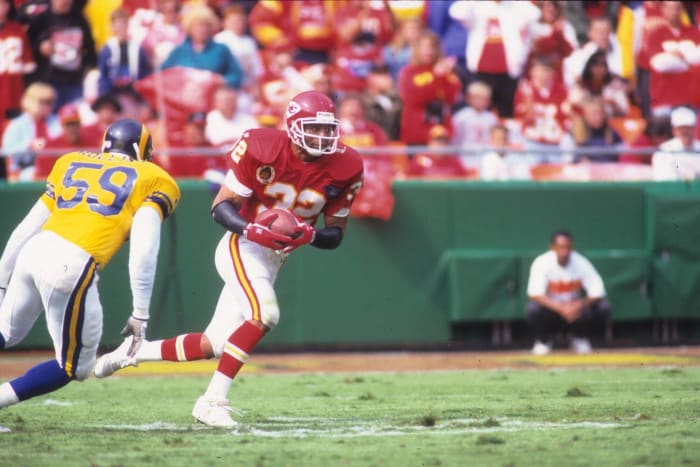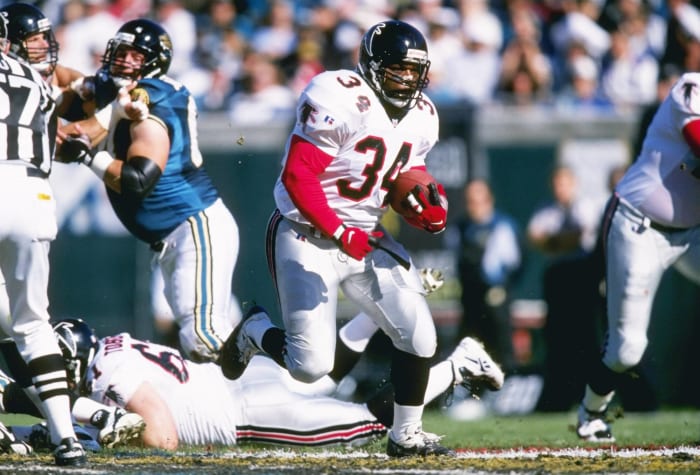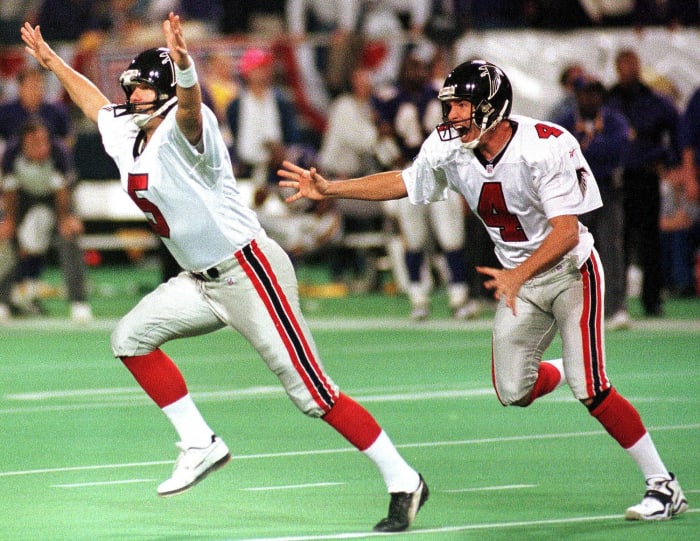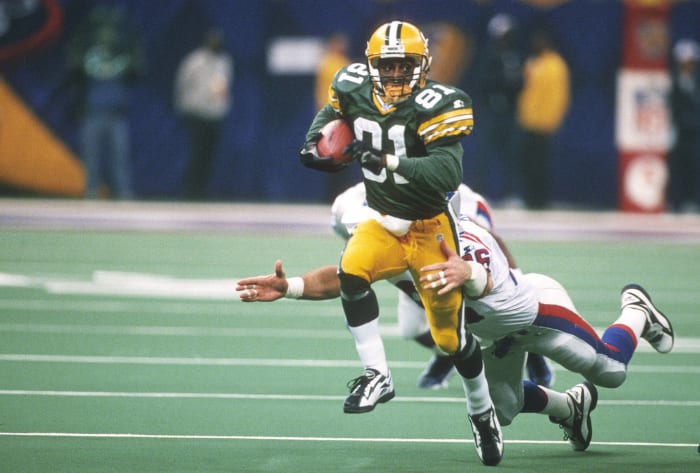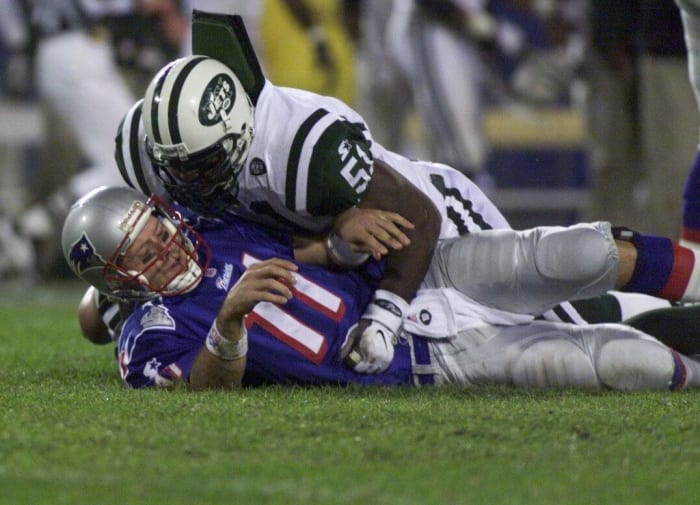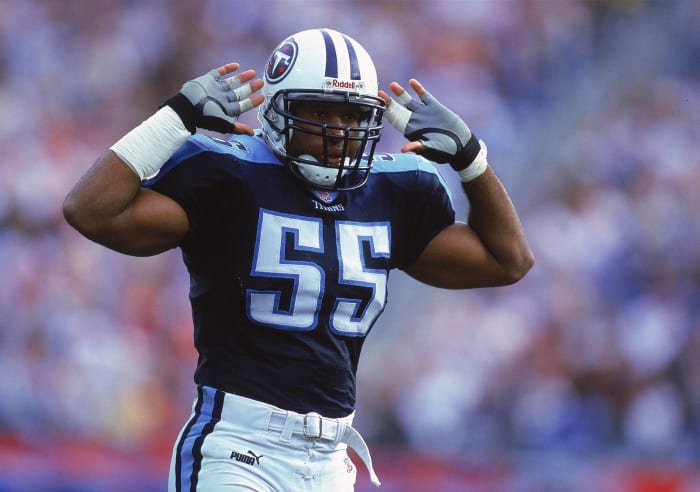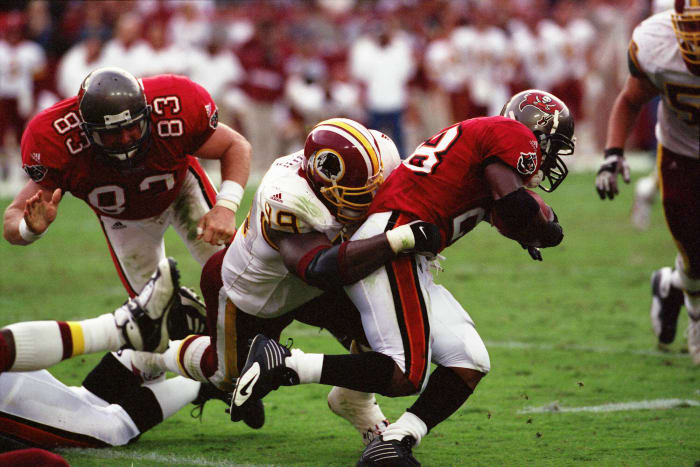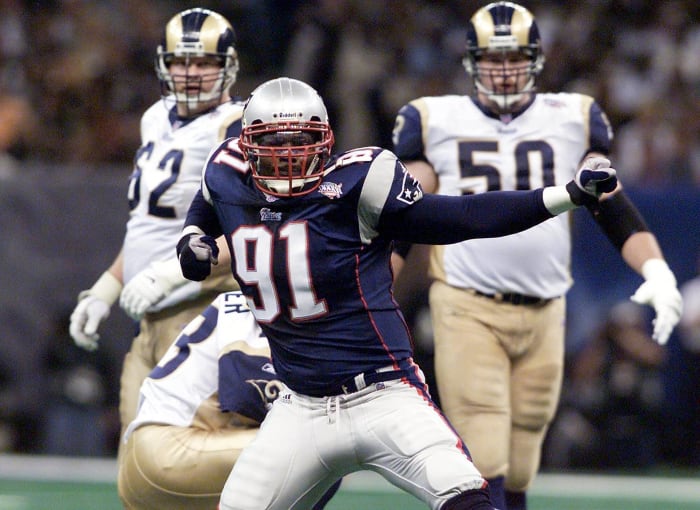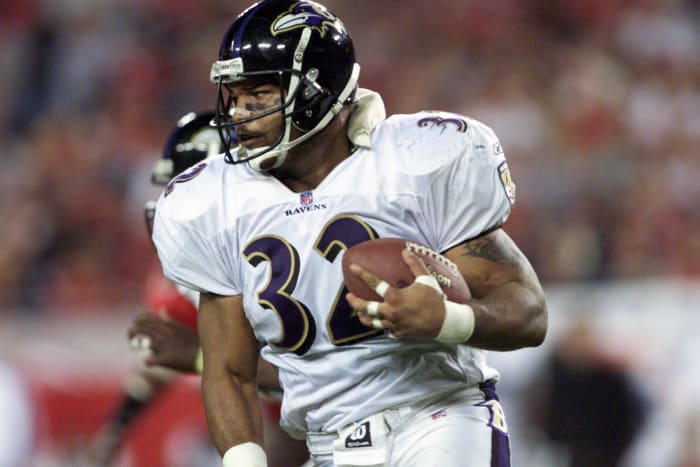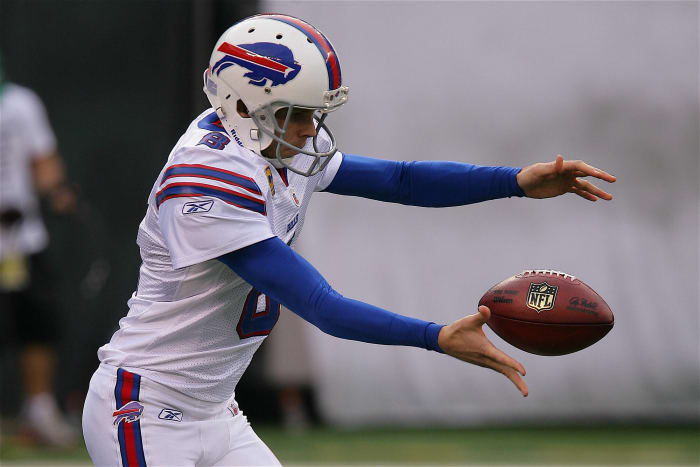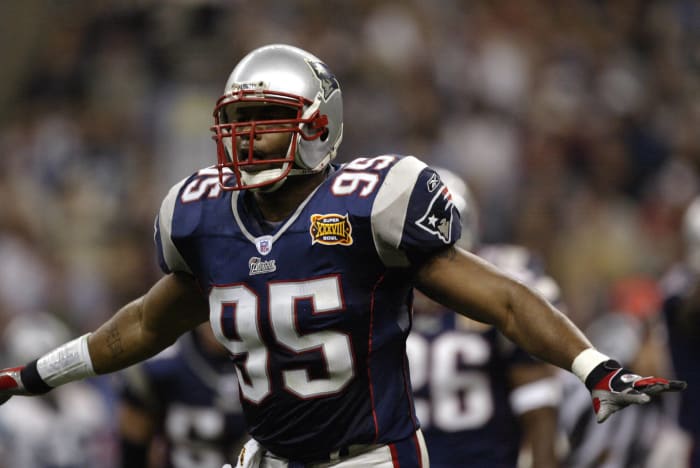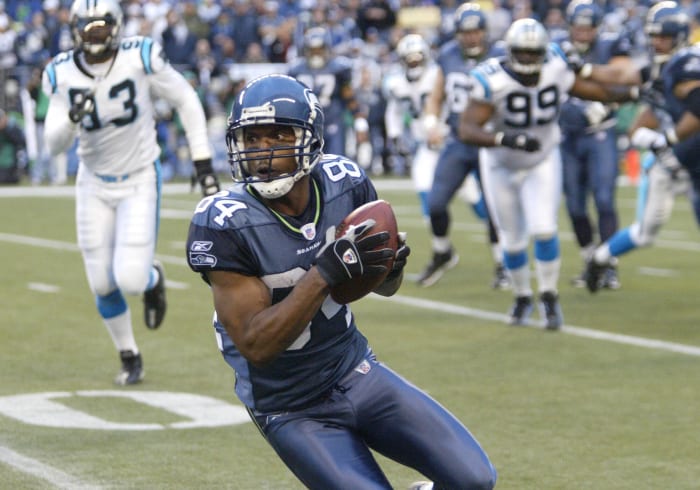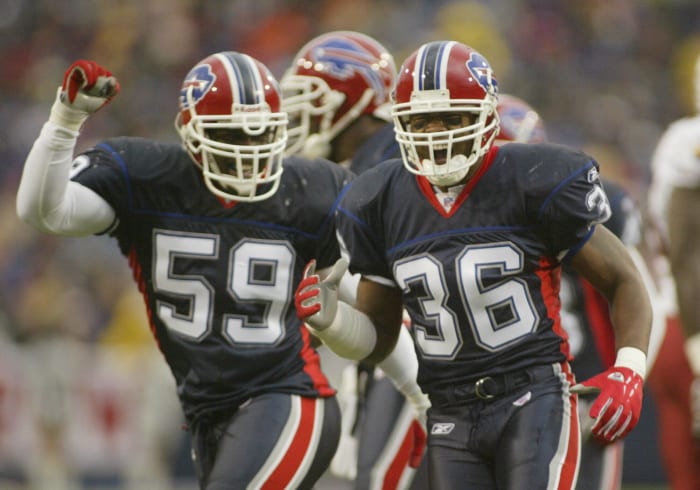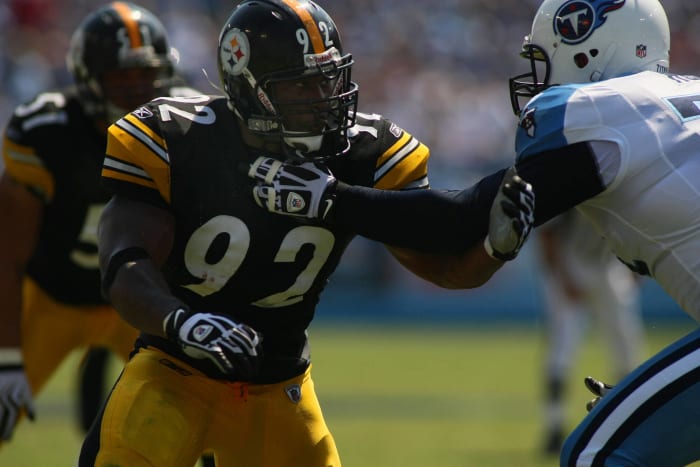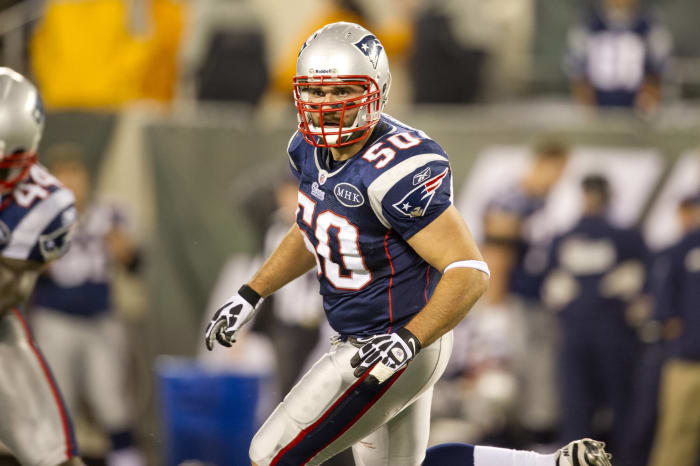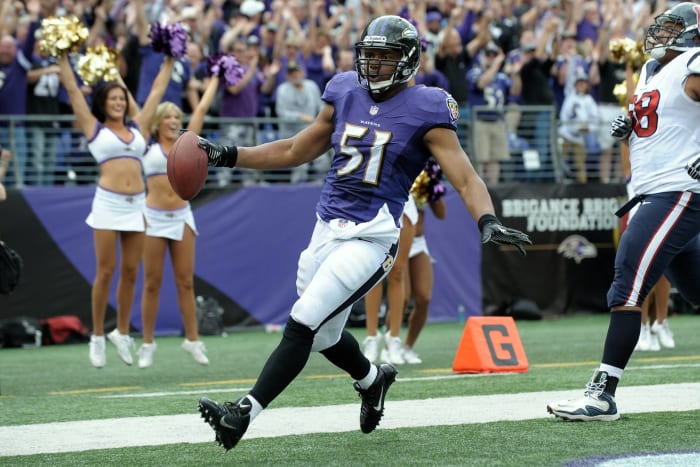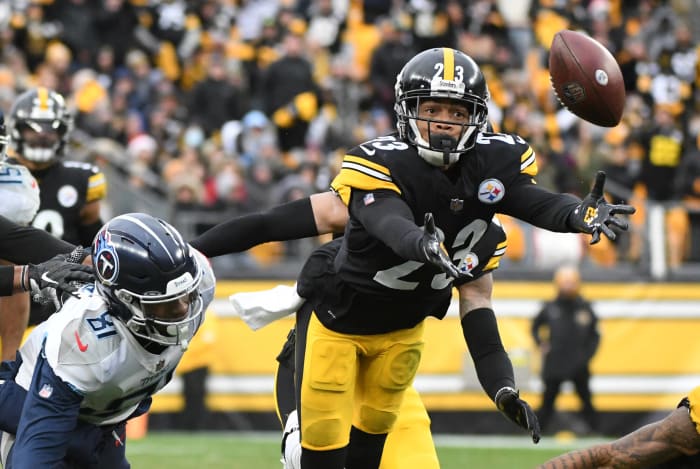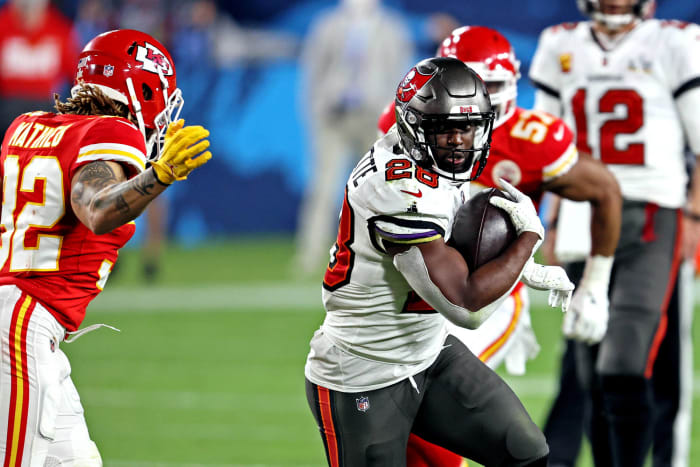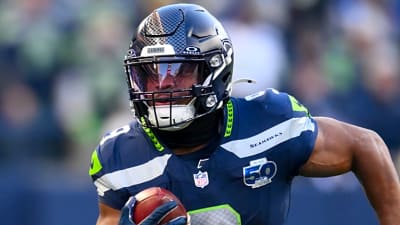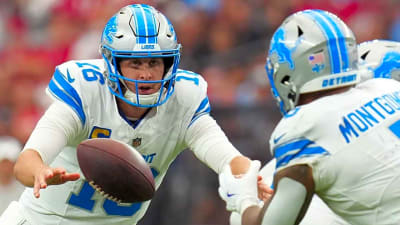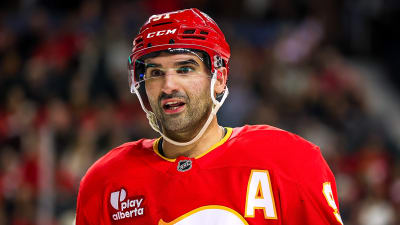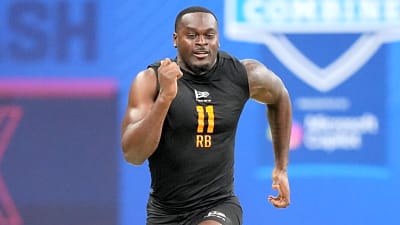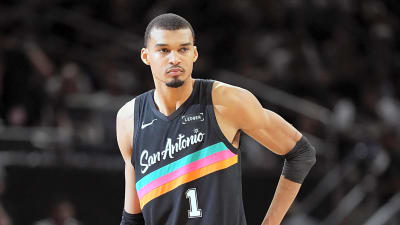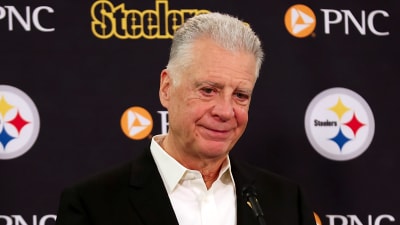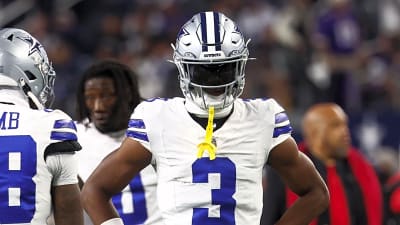Teams spend their money in the spring, but important veteran additions occur every summer. Excluding 2011, when the lockout forced all free agents to wait until summer to sign, here are the most impactful summer additions in the NFL's free agency era. (Note: quarterbacks are not included; we discussed late-offseason QB moves here.)
1 of 30
Kansas City Chiefs: Marcus Allen (1993)
Joseph Patronite/Getty Images
The Chiefs used the first year of full-fledged free agency to pair two legendary players. After trading for Joe Montana in April, the Chiefs inked Allen in June. The back half of Allen's Raiders career deserves more attention, as a feud with Al Davis led to a demotion and a bitter exit. It took years for Allen to escape the Raiders, as free agency did not come about until his 11th season. The Chiefs signed Allen to be a third-down back; he delivered more. Allen led the NFL with 12 rushing TDs in 1993, en route to eventually breaking Jim Brown's then-career record, and helped the Chiefs to the AFC title game. The ageless back was a key part of Chiefs' offenses until 1997.
2 of 30
Atlanta Falcons: Craig Heyward (1994)
Andy Lyons/Allsport/Getty Images
Productive with the Saints, Heyward saw his weight issue hinder him with the Bears in 1993. The husky running back ballooned beyond 300 pounds in Chicago, irking the coaching staff before a 1994 release. In June 1994, the Falcons took a flier with a one-year deal. Heyward rewarded Atlanta. A slimmer Heyward totaled 1,114 scrimmage yards in '94 and was rewarded with a two-year extension that December. In 1995, the Falcons then received Heyward's only 1,000-yard rushing season. It helped the team to the playoffs. Heyward played three Falcons seasons, peaking in terms of production with the then-NFC West club.
3 of 30
Atlanta Falcons: Morten Andersen (1995)
CRAIG LASSIG/AFP via Getty Images
In the second year of the salary cap era, the Saints cut Andersen with an aim to re-sign him at a salary lower than $985,000. Instead, the rival Falcons swooped in. The Falcons gave Andersen a three-year, $2.4 million deal, agreeing to terms within hours of the future Hall of Famer's July release. The left-footed ace spent the next five seasons in Atlanta, earning All-Pro acclaim in his first and playing a crucial role in the Falcons' initial Super Bowl berth. Andersen hit a 38-yard game-winner to send the Falcons past the 15-1 Vikings to Super Bowl XXXIII. Andersen later circled back to Atlanta in 2006, finishing off a 26-year career.
4 of 30
Green Bay Packers: Desmond Howard (1996)
Focus on Sport/Getty Images
Howard could not live up to the expectations placed upon him in Washington, washing out after struggling as a wide receiver in three seasons. That became Green Bay's gain. After a year in Jacksonville, Howard signed a one-year deal with the Packers in July 1996. The team was not sold on the 1991 Heisman winner in training camp, but a preseason punt-return TD provided a prelude to a time-capsule season. Howard returned five kicks or punts for touchdowns in 1996 — two in the playoffs — and averaged an astonishing 15.1 yards per punt return. He punctuated the season with his game-altering Super Bowl kick return, parlaying MVP honors into a 1997 Raiders deal.
5 of 30
Green Bay Packers: Bill Schroeder (1996)
Andy Lyons/Allsport/Getty Images
Going from Sheboygan, Wis., to Division III Wisconsin-La Crosse to the Packers brought the potential for a hometown success story. The Pack, however, traded Schroeder to the Patriots in 1995. The 1994 sixth-round pick did not stick in New England and caught back on with his local team in August 1996. It took multiple years of apprenticeship, but the lanky wide receiver became a full-time starter by 1999. The 6-foot-3 target eclipsed 900 receiving yards each year from 1999-2001, teaming with the higher-paid Antonio Freeman during that span. Schroeder's second Green Bay stay lasted six seasons.
6 of 30
Kansas City Chiefs: Mark McMillian (1997)
Andy Lyons/Allsport/Getty Images
One of the best pound-for-pound NFLers of his era, McMillian started four straight seasons — with the Eagles and Saints — despite a 5-foot-7, 154-pound frame. After New Orleans made McMillian a post-June 1 cut, the feisty cornerback found his way to Kansas City on a three-year deal. McMillian made tremendous contributions for a 13-3 Chiefs squad. He first notched a game-sealing end zone interception to help the Chiefs down the Bills. "Mighty Mouse" intercepted seven more passes in 1997, tallied a then-Chiefs-record 274 INT return yards and added three TDs. The Chiefs earned the AFC's No. 1 seed that season.
7 of 30
New York Jets: Bryan Cox (1998)
Jim Davis/The Boston Globe via Getty Images
The Bears gave Cox a four-year, $13.5 million deal in 1996 but cut bait after two seasons, using the post-June 1 designation to save money. After longtime Jets linebacker Marvin Jones suffered a torn ACL in August 1998, Bill Parcells' team signed Cox. The temperamental linebacker became part of a historic free-agent haul, with the Jets having added Curtis Martin, Kevin Mawae and Vinny Testaverde in 1998. The ex-Dolphins standout notched two six-sack seasons with the Jets, despite being an off-ball 'backer, and totaled six forced fumbles in three Big Apple years. Later a Patriots cog, Cox helped Bill Belichick's Jets defense to the '98 AFC title game.
8 of 30
Tennessee Oilers: Eddie Robinson (1998)
Scott Halleran/Allsport/Getty Images
Robinson was there for each version of the Oilers-Titans metamorphosis. A 1992 Houston draftee, the linebacker starter left for a Jacksonville deal in 1996. Helping the Jaguars begin their quick surge, Robinson found himself back in free agency after an August 1998 release. Now in Tennessee, the Oilers brought him back on a one-year deal two days later. A four-year pact worth upwards of $11 million allowed Robinson to stay with the team as it became the Titans in 1999, and the Super Bowl XXXIV starter — after a six-sack season — was an integral defensive cog for two playoff teams during his second four-year Tennessee stay.
9 of 30
Washington: Marco Coleman (1999)
Michael J. Minardi/Getty Images
Washington's 2000 free agency lives on in infamy, with Dan Snyder's first class as owner leading to a slew of aging additions — Deion Sanders, Bruce Smith and Jeff George among them. But the team did see production from another player in this class. Coleman initially signed with Washington in 1999, joining on a one-year, $400,000 accord. After a 6.5-sack season, the ex-Dolphin inked a big-ticket pact — six years, $26M — as Snyder moved to outflank a Cardinals offer and pair Coleman with Smith in 2000. Although Coleman played two years on that contract, he racked up a career-high 12 sacks in 2000 en route to his only Pro Bowl.
10 of 30
San Francisco 49ers: Charlie Garner (1999)
Dale Zanine/Icon Sportswire
Garrison Hearst suffered a career-threatening ankle injury on the first play of the 1998 49ers' divisional-round loss to the Falcons. Hearst ended up missing two seasons. The 49ers did wait out Hearst's recovery, signing Garner while the Pro Bowler rehabbed. The 49ers gave Garner a two-year, $1.44 million deal in July 1999, shortly after the Eagles cut him. The dual-threat back enjoyed two fantastic 49ers seasons, topping 1,700 scrimmage yards in each and earning his only Pro Bowl bid in 2000. While these were not successful 49ers seasons, Garner joined Terrell Owens in helping Jeff Garcia to big early-career numbers. Hearst returned in 2001, and Garner signed with the Raiders.
11 of 30
Oakland Raiders: Tyrone Wheatley (1999)
Matt A. Brown/Icon Sportswire
Jon Gruden's first Raiders tenure involved a brigade of ring-chasing veterans stopping through. Wheatley arrived before that line had fully formed, signing during the same offseason Gruden brought in Rich Gannon. A former Giants first-round pick whom the team traded to the Dolphins earlier in 1999, Wheatley did his best work in Oakland. The power runner spent six years in the Bay Area, leading the Raiders in rushing thrice. This included a 1,046-yard 2000 season, one in which the Silver and Black voyaged to the AFC championship game. Wheatley became a Charlie Garner sidekick soon, but the team prioritized him into the mid-2000s.
12 of 30
New England Patriots: Bobby Hamilton (2000)
TIM SLOAN/AFP via Getty Images
Hamilton joined Bryan Cox as a Bill Belichick come-with guy, following the former Jets defensive coordinator to New England. Hamilton beat Cox by a year, signing with the Patriots in July 2000. He became a key piece for the 2001 Pats' unexpected rise, tallying seven sacks that season and punctuating the year with a Super Bowl XXXVI drop of Kurt Warner. Playing a 3-4 defensive end role for the Pats, Hamilton remained a starter through the team's second Super Bowl-winning season in 2003. The interior D-lineman, whom Bill Parcells used as a backup in New York, batted down 15 passes as a Patriot.
13 of 30
Jacksonville Jaguars: Paul Spicer (2000)
Al Messerschmidt/Getty Images
Summer signings often lead to short-term stays; that was not the case for the Jaguars and Spicer. After the Lions cut the ex-CFL defensive lineman, the Jaguars took a flier in August 2000. Spicer stayed with the Jags for nine seasons, becoming a bigger part of their defense during the back half of his tenure. Working as a part-time starter and rotational rusher for five years, Spicer became a full-time starter in 2005, helping the Jags back to the playoffs. After a 7.5-sack 2005 slate, Spicer matched that total to aid the '07 Jags to the postseason. He topped that year off with a sack of Ben Roethlisberger in a wild-card upset.
14 of 30
Baltimore Ravens: Sam Gash (2000)
Andy Lyons/Getty Images
The Ravens did some major retooling on offense in 2000, adding Trent Dilfer, Shannon Sharpe and Ben Coates by July. This came after Baltimore used the No. 5 overall pick on Jamal Lewis. In August, the team acquired Lewis' lead blocker. For a team that struggled to generate consistent passing offense, Gash paving lanes for Lewis proved vital. The bruising rookie rushed for 1,364 yards, and Gash whom the Bills had cut in April, despite back-to-back Pro Bowl seasons — collected a Super Bowl ring after later aiding Lewis to 338 playoff yards. Fullbacks remained key fixtures in 2000, and Gash was a Ravens regular for three years.
15 of 30
Oakland Raiders: Jerry Rice (2001)
Brian Bahr/Getty Images
Three surefire top-five NFLers have hit free agency. Before Peyton Manning and Tom Brady, Rice tested the waters. The wideout icon was linked to the Lions and Seahawks after the 49ers made him a post-June 1 cut. Months after seeing Terrell Owens upstage "Jerry Rice Day" (the legend's final Candlestick Park home game), Rice stayed in the Bay Area by signing a four-year, $5.4 million Raiders contract. Joining ex-49ers assistant Jon Gruden in Oakland, Rice showed he had juice left by posting his first 1,000-yard season since 1998. He then made the Pro Bowl in 2002, at 40, adding the 14th 1,000-yard slate to his unrivaled resume. The Raiders probably do not book a Super Bowl XXXVII trip without Rice.
16 of 30
New England Patriots: Antowain Smith (2001)
John Iacono/SI/Icon Sportswire
The starting running back on the first two Super Bowl-winning Patriots teams headed east after the Bills cut him in May 2001. Initially a Thurman Thomas Bills backup, Smith usurped the Hall of Famer by his second season but eventually wound up benched by 2000. After unsuccessfully seeking a trade, Smith wound up a Patriots signee by June. Part of an all-time free agency class, Smith produced his second 1,000-yard season in 2001 (1,157 yards, 12 TDs) and rushed for 92 yards in Super Bowl XXXVI. Still going by age 31, though splitting time with Kevin Faulk, Smith added 252 playoff rushing yards to help the '03 Pats to another title.
17 of 30
Buffalo Bills: Brian Moorman (2001)
Richard A. Brightly/Icon Sportswire
Multiple offseasons of development (punter development, but still) in Seattle did not produce a game opportunity. The Seahawks cut the 1999 undrafted free agent after their 2000 training camp. It took Moorman, who played at Division II Pittsburg State, nearly another year to land a gig, but the Bills offered him a job in July 2001. Moorman stayed in Buffalo until 2012, serving as the longest-tenured specialist in Bills history. A two-time All-Pro, Moorman earned second-team All-Decade honors and made his way back to Western New York (after a brief Dallas stay) to close his career in 2013.
18 of 30
New England Patriots: Roman Phifer (2001)
Brian Bahr/Getty Images
Drafted by the L.A. Rams in 1991, Phifer bailed on the St. Louis version at the wrong time. The UCLA product joined the Jets as a free agent in 1999, but as his former team won Super Bowl XXXIV, Phifer formed a connection with then-Jets defensive coordinator Bill Belichick. After the Jets cut Phifer in February 2001, he reunited with Belichick that August. Despite being 33, Phifer stepped in as a Patriots regular alongside Tedy Bruschi and Mike Vrabel. Phifer started seven playoff games in four Pats seasons, putting together two 100-plus-tackle years, collecting three rings and beating his former team in Super Bowl XXXVI.
19 of 30
Seattle Seahawks: Bobby Engram (2001)
Jesse Beals/Icon Sportswire
The Bears re-signed Engram in 1999, keeping their former second-round pick on a multiyear deal. A knee injury, however, sidelined Engram for 13 games in 2000. New Bears GM Jerry Angelo cut Engram in '01. Two days after that call, the Seahawks found one of their most productive receivers in team history. Seattle gave Engram only a one-year, $477,000 deal. A two-time 900-yard receiver with the Bears, Engram became Matt Hasselbeck's most reliable target. Prolific stats rarely came Engram's way, but the first-down machine played eight seasons in Seattle, signing three more Seahawks contracts and helping the team to five playoff berths.
20 of 30
Tampa Bay Buccaneers: Keenan McCardell (2002)
Doug Pensinger/Getty Images
NFL rules at the time mandating the post-June 1 cut designation be used after that date kept McCardell off the market until summer. McCardell delivered six strong years for the Jaguars; he and Jimmy Smith combined for 1,061 catches from 1996-2001 — then a six-season record for teammates. But the Jags signed ex-Steeler Bobby Shaw in free agency. Other suitors emerged for the then-32-year-old McCardell, but the Bucs gave him a four-year, $10 million deal. McCardell became an instant upgrade opposite Keshawn Johnson, catching two TD passes in Super Bowl XXXVII. After a Johnson-Jon Gruden 2003 dustup led the mercurial WR1 off the team, McCardell topped 1,100 yards in 2003 before leaving Tampa.
21 of 30
Buffalo Bills: Lawyer Milloy (2003)
Rick Stewart/Getty Images
In Bill Belichick's first month as Patriots head coach, Milloy signed a seven-year, $35 million extension. That February 2000 deal led to two more Pro Bowls, including Milloy's fourth honor in 2002. This still keyed a bitter 2003 divorce. Belichick held the line on a pay-cut request until September, when he shockingly cut the star safety. This left many Patriot players dismayed, and Milloy signed a four-year, $15M Bills deal a day later. None of Milloy's 43 Bills games were as memorable as his first — a 31-0 Bills rout of the Pats. While New England recovered to win another Super Bowl that year, Milloy and Drew Bledsoe exacted a memorable revenge measure. Milloy played until 2010.
22 of 30
Philadelphia Eagles: Jeremiah Trotter (2004)
Kirby Lee/NFLPhotoLibrary
Trotter initially left Philadelphia for a big-ticket Washington offer in 2002. Dan Snyder authorized a seven-year, $35.5 million deal — the biggest of the '02 free agency period — but it did not pan out. Washington cut Trotter on June 2, 2004; a month later, he was back in Philly on a one-year contract. With Washington still owing Trotter money, the Eagles benefited via a low-cost agreement. It took Trotter a half-season to regain his starting job, but the Eagles kept him in that role for three seasons in his second stint. Two more Pro Bowls followed, and Philly gave its standout linebacker a more lucrative deal in 2005.
23 of 30
Pittsburgh Steelers: James Harrison (2004)
Greg McWilliams/Icon Sportswire
Known for a lengthy Steelers tenure, the future Defensive Player of the Year spent part of 2004 with the Ravens. The Ravens gave Harrison a reserve/futures contract in January 2004, bringing him over from Pittsburgh. But Baltimore sent the former UDFA to Germany as part of the now-defunct NFL Europe developmental league. Harrison suffered an injury and was cut upon returning in June. The Steelers brought him back in July on just a two-year, $535,000 deal. The late-blooming pass rusher gradually grew into one of this generation's most feared players, making five Pro Bowls and signing five more Steelers contracts from 2006-17.
24 of 30
Tennessee Titans: Rob Bironas (2005)
Icon Sportswire
Kicking competitions regularly lead to specialists relocating making late-summer relocations. Bironas lost battles in three straight summers, being cut by the Packers, Buccaneers and Steelers from 2002-04. He finally stuck around with the Titans, who signed him in June 2005. Bironas took over for Gary Anderson, who finished his 23-year career as a Titan in 2004. Tennessee turned to Bironas as its kicker for the next nine seasons. Part of multiple Titans playoff teams (and landing a solid Chris Berman alias), Bironas hit a 60-yard game-winner in 2006 and earned All-Pro recognition in 2007. His game career unfolded entirely with the Titans.
25 of 30
New England Patriots: Rob Ninkovich (2009)
Rich Kane/Icon Sportswire
A backup with the Saints and Dolphins for three seasons, Ninkovich became a free agent after New Orleans cut him in July 2009. The Patriots made a small investment by signing him days later. Considering Ninkovich had played eight games in three seasons, this seemed like an inconsequential transaction. But Ninkovich became an edge-rushing staple in New England for the next eight years. The former Saints fifth-rounder was a Pats starter by 2010, and he registered 37 sacks from 2011-15. Ninkovich added six playoff sacks, including a crucial fourth-quarter drop of Russell Wilson in the Pats' come-from-behind Super Bowl XLIX win.
26 of 30
Seattle Seahawks: Michael Robinson (2010)
Rich Kane/Icon Sportswire
Nearly two months before the Seahawks revitalized Marshawn Lynch's career with a midseason trade, they picked up his lead blocker. Robinson garnered attention as a Penn State quarterback, but the 49ers stashed him on special teams for three years. San Francisco cut Robinson just before the 2010 season. As Pete Carroll made final preparations for his first Seattle season, he signed Robinson and turned him into a fullback. Robinson operated as a regular for four seasons, helping the Lynch-Russell Wilson era get off the ground and ending his career with a Super Bowl ring. The 2011 Pro Bowler rode his Seattle stay to an NFL Network gig.
27 of 30
Baltimore Ravens: Daryl Smith (2013)
Zumapress/Icon Sportswire
The Jaguars drafted Smith in the 2004 second round and gave him 124 starts across nine seasons. The last of those ended after two games, with a groin injury (and more complex NFL roster math, given the IR rules of the period) ending Smith's Jacksonville tenure in 2012. The Ravens added the then-30-year-old vet in June 2013 and discovered he had plenty left in the tank. The Jags' No. 2 all-time tackler put together a 123-tackle, five-sack, three-INT year and signed a four-year, $16M extension in 2014. Smith then led the NFL with five forced fumbles, boosting Baltimore to the '14 playoffs. The Ravens relied on Smith as a three-year starter.
28 of 30
Denver Broncos: Evan Mathis (2015)
AAron Ontiveroz/The Denver Post via Getty Images
Both Broncos 2014 guard starters — Louis Vasquez, Orlando Franklin — were gone by 2015. Seeking a veteran on a much younger O-line, the Broncos added Mathis on a one-year, $3.25 million contract in August. Months earlier, Peyton Manning agreed to return for a fourth and final Broncos season by taking a $4M pay cut. While Manning eventually made that money back via incentives, Mathis helped the QB icon cash in by helping Denver to a Super Bowl 50 win. Pro Football Focus (long Mathis admirers) gave the ex-Eagles Pro Bowler the top run-blocking grade among guards in 2015, and he scored a Cardinals deal to end his career a year later.
29 of 30
Pittsburgh Steelers: Joe Haden (2017)
Philip G. Pavely-USA TODAY Sports
Amid a rebuild plan that saw several quality starters depart, the Browns jettisoned their top cornerback. Cleveland waited until August 30 to cut Haden, doing so after he declined a pay cut. The Chiefs, Saints, Eagles, 49ers, and Dolphins pursued Haden, but he chose to sign with the Steelers within hours of his Browns release. Haden signed a three-year, $27 million deal and became a five-year Steelers starter. Playing into his early 30s, Haden assumed a lead role in elevating the Steelers defense into a top-tier unit. T.J. Watt's 2017 arrival helped as well, but Haden anchored Pittsburgh's CB corps — later on an $11M-per-year deal — for years.
30 of 30
Tampa Bay Buccaneers: Leonard Fournette (2020)
Matthew Emmons-USA TODAY Sports
Drafted ahead of Patrick Mahomes and Deshaun Watson in 2017, Fournette did make big contributions for the Jaguars. The No. 4 overall pick powered Jacksonville's offense to a stunning AFC championship game berth in 2017 and notched a career-high 1,674 scrimmage yards in 2019. On- and off-field trouble led to a Jaguars divorce (and a Fournette grievance against then-Jags honcho Tom Coughlin) in August 2020. Months after trying to trade for Fournette, the Buccaneers signed him. The suddenly all-in Bucs turned to Fournette down the stretch that year, and "Playoff Lenny" (448 postseason scrimmage yards) helped Tom Brady secure ring No. 7. The power back earned two more Bucs contracts.
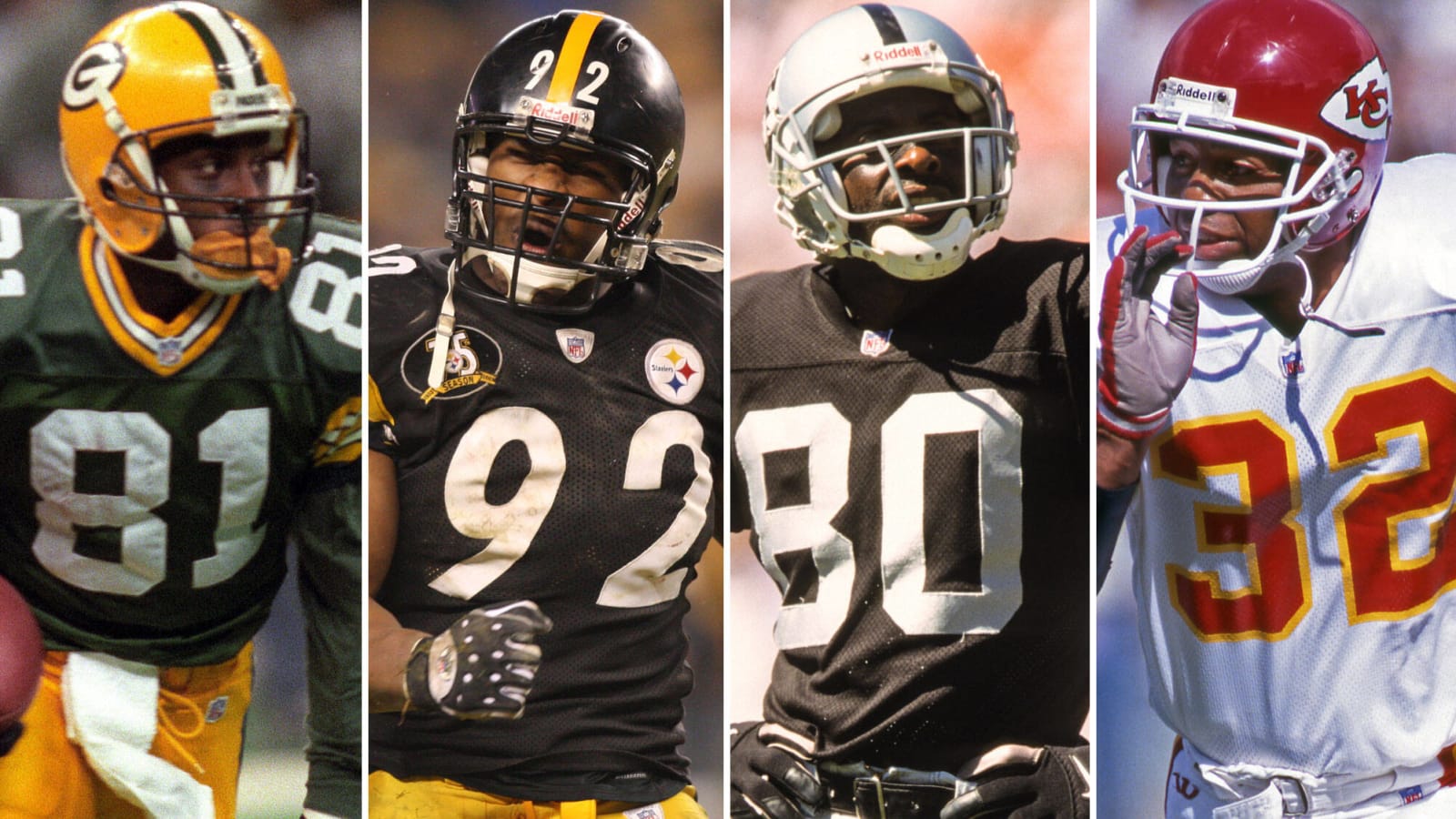
 +
+
